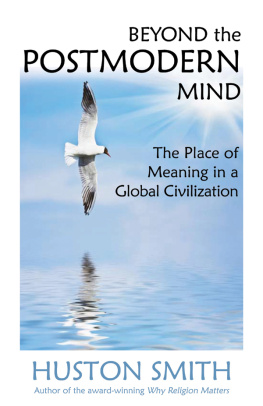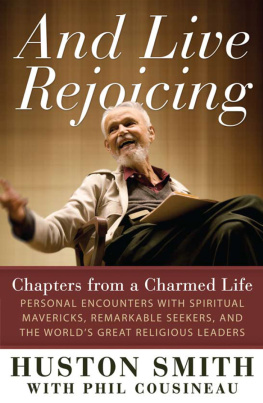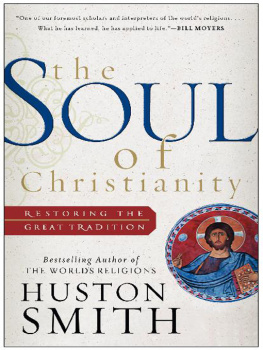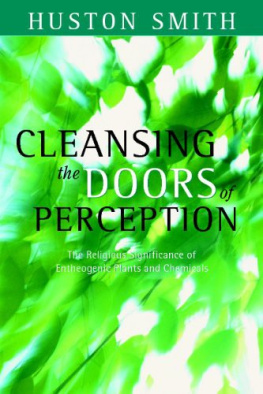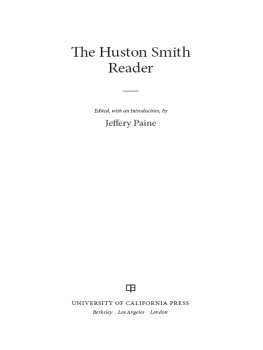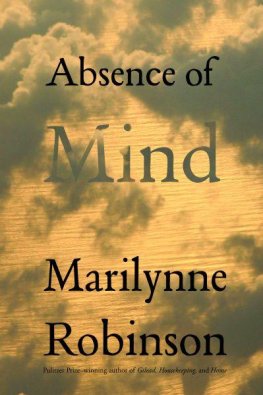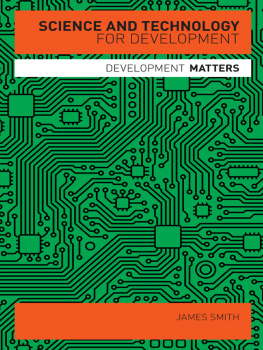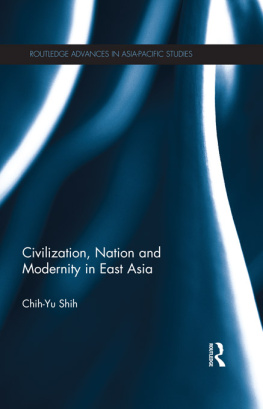Huston Smith - Beyond the Postmodern Mind: The Place of Meaning in a Global Civilization
Here you can read online Huston Smith - Beyond the Postmodern Mind: The Place of Meaning in a Global Civilization full text of the book (entire story) in english for free. Download pdf and epub, get meaning, cover and reviews about this ebook. year: 2003, publisher: Quest Books, genre: Religion. Description of the work, (preface) as well as reviews are available. Best literature library LitArk.com created for fans of good reading and offers a wide selection of genres:
Romance novel
Science fiction
Adventure
Detective
Science
History
Home and family
Prose
Art
Politics
Computer
Non-fiction
Religion
Business
Children
Humor
Choose a favorite category and find really read worthwhile books. Enjoy immersion in the world of imagination, feel the emotions of the characters or learn something new for yourself, make an fascinating discovery.
- Book:Beyond the Postmodern Mind: The Place of Meaning in a Global Civilization
- Author:
- Publisher:Quest Books
- Genre:
- Year:2003
- Rating:4 / 5
- Favourites:Add to favourites
- Your mark:
- 80
- 1
- 2
- 3
- 4
- 5
Beyond the Postmodern Mind: The Place of Meaning in a Global Civilization: summary, description and annotation
We offer to read an annotation, description, summary or preface (depends on what the author of the book "Beyond the Postmodern Mind: The Place of Meaning in a Global Civilization" wrote himself). If you haven't found the necessary information about the book — write in the comments, we will try to find it.
Beyond the Postmodern Mind: The Place of Meaning in a Global Civilization — read online for free the complete book (whole text) full work
Below is the text of the book, divided by pages. System saving the place of the last page read, allows you to conveniently read the book "Beyond the Postmodern Mind: The Place of Meaning in a Global Civilization" online for free, without having to search again every time where you left off. Put a bookmark, and you can go to the page where you finished reading at any time.
Font size:
Interval:
Bookmark:
BEYOND the POSTMODERN MIND
HUSTON SMITH
BEYOND the POSTMODERN MIND
The Place of Meaning
in a Global Civilization
Updated and Revised

Learn more about Huston Smith and his work at www.hustonsmith.net
Find more books like this at www.questbooks.net
Copyright 1982, 1989, 2003 by Huston Smith
First Quest Edition 1984
Second Edition 1989
Third Edition 2003
Quest Books
The Theosophical Publishing House
PO Box 270
Wheaton, IL 60187-0270
Without limiting the rights under copyright reserved above, no part of this publication may be reproduced, stored in or introduced into a retrieval system, or transmitted, in any form, or by any means (electronic, mechanical, photocopying, recording, or otherwise), without the prior written permission of the publisher of this book.
The scanning, uploading, and distribution of this book via the Internet or via any other means without the permission of the publisher is illegal and punishable by law. Please purchase only authorized electronic editions, and do not participate in or encourage electronic piracy of copyrighted materials.
While the author has made every effort to provide accurate telephone numbers and Internet addresses at the time of publication, neither the publisher nor the author assumes any responsibility for errors or for changes that occur after publication. Further, the publisher does not have any control over and does not assume any responsibility for author or third-party websites or their content.
Library of Congress Cataloging-in-Publication Data
Smith, Huston.
Beyond the postmodern mind: the place of meaning in a global civilization / Huston Smith.3rd Quest ed.
p. cm.
Rev. ed. of: Beyond the post-modern mind. c1989.
Includes bibliographical references.
ISBN 0-8356-0830-1
1. Philosophy, Modern20th century. 2. Postmodernism. I. Smith,
Huston. Beyond the post-modern mind. II. Title.
B804.S576 2003
190'.9'04dc21
2003041588
ISBN for electronic edition, e-pub format: 978-0-8356-2078-9
4 3 2 1 * 03 04 05 06 07 08
In memory of Serena Karlan, and for the future that Sierra and Isaiah Senyak and Antonio Banuelos token
Preface to the Third Edition
If, by some strange device, a man of our century could step backwards in time and mix with the people of a distant age, Gai Eaton wrote in The King of the Castle, he would have good cause to doubt either their sanity or his own (p. 7). The suns daily cycle, a ravens flight, mossy oaks, and water gushing from a glade would look familiar enough, but the meanings they carried for his new associates would be different. Each would think he knew what constitutes common sense and human normality, but their common sense would differ from his and their normality might seem to him abnormal. Questioning everything they took for granted and astonished that they did not see how much their conclusions were controlled by arbitrary assumptions, he would find everything he took for granted similarly called into question. His Why? would be met with their Why?, and he would have no answer.
The essays here assembled attempt a move like the one just envisioned: they invite us to step outside our current Western outlook to see it in perspective. The limitations of earlier outlooks are so obvious that we forget that ours, too, is built on premises history will smile on. Science and the historical record we now possess may seem to exempt us from the perspectival character of human vision, but we know, of course, that they do not. Like those who have lived before us, we too have fished certain objectives from the sea of human possibilities. These in turn have firmed up premises that support them, and from these premises an entire outlook has been spunsuch possibilities are what these essays try to show. To compare our worldview with others is not to set light against shadow. It is to compare twilight zones; different kinds of limitations, as though a man tunneling his way out of prison were to emerge within the perimeter, exchanging one cell for another. So it must always be, Eaton concludes, unless the prisoner learns that freedom lies in quite another direction, never through the tunnel of time (ibid.).
We shall encounter this other, atemporal and noncumulative dimension of knowledge in of this book. Here the point is that the stages peoples outlooks pass through on the temporal continuum have led the West to one that has come to be called Postmodern to distinguish it from the Modernity that began in the seventeenth century and ended around the middle of the last century. The Modern Mind took its cues from the new worldview that science introduced, but twenty-first-century science has abandoned not just that worldview, but worldviews generally. From Aristotle to Dante, the world was pictured as a series of concentric spheres. Newton replaced that with his clockwork universe, but quantum mechanics gives us, not a new picture of the world, but no picture at all. And philosophy has followed suit. Metaphysics died around the time that God died, Langdon Gilkey has observed, tying its death to the death of God movement that Nietzsche announced, but which took a half-century to come to public notice.
The essays in this book work toward bringing the world back into focus, and as the view that emerges resembles traditional ones more than it does either the Modern worldview or Postmodern lack thereof, the presumption that these latter have permanently retired the way people used to see things needs to be questioned at the outset. The ways in which Modernity and Postmodernity have assumed that their perspectives were less limited than previous ones turn out to be diametrically opposed to each other. Whereas the Modern Mind assumed that it knew more than its predecessors because the natural and historical sciences were flooding it with new knowledge about nature and history, the Postmodern Mind argues (paradoxically) that it knows more than others did because it has discovered how little the human mind can know. How well we now know how little we know. we shall find James Cutsinger noting in .
It is a good part of this books intent to question these dualand to repeat, contradictoryclaims to superiority. The Modern Minds mistake was to think that seeing further in a horizontal direction would compensate for loss of the vertical dimension. If we visualize a line that wanders upward and then downward again to silhouette the Himalayan range, it is as if Modernity grabbed hold of both ends of that line and stretched them apart. This collapsed the humps to a straight line along the base of the range, but Modernity reasoned that since that line could be indefinitely extended, it would enclose a volume greater than the one the line originally defined.
For the error of Postmodernism, we can visualize the same Himalayan range, but this time work with it differently. We are now inside a bungalow looking out on Mount Everests awesome presence. The air is cold outside, so our breath begins to fog the window. Ventilation is poor, causing the moisture on the pane to condense until at some point it becomes difficult to determine whether the shapes we see are mountains or frosted textures of our own breath as it congeals on the pane. Visitors arrive. Not having gazed through the window when it was clear, they do not know what lies beyond it, so they fix on the foreground, assuming unthinkingly that shapes they see are on the windowpane only. Put straightforwardly, the mistake of Postmodernism is to assume that human beings look out on the world through windows so befogged that it would be unwise to assume that what they see is in the world itself.
Next pageFont size:
Interval:
Bookmark:
Similar books «Beyond the Postmodern Mind: The Place of Meaning in a Global Civilization»
Look at similar books to Beyond the Postmodern Mind: The Place of Meaning in a Global Civilization. We have selected literature similar in name and meaning in the hope of providing readers with more options to find new, interesting, not yet read works.
Discussion, reviews of the book Beyond the Postmodern Mind: The Place of Meaning in a Global Civilization and just readers' own opinions. Leave your comments, write what you think about the work, its meaning or the main characters. Specify what exactly you liked and what you didn't like, and why you think so.

